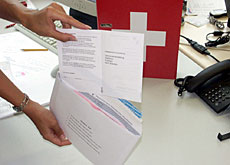Swiss wants to improve American voting system

Swiss computer specialist Beat Fehr wants to export Switzerland’s voting system to the United States to make US elections much more reliable.
He argues that he could save the Americans millions of dollars, as well as promote confidence among voters that the elections are secret and secure.
Switzerland’s system of direct democracy means that voters go to the polls at least four times a year to decide on issues ranging from changes to the federal constitution to whether to build a local car park.
Fehr believes this expertise could help avoid a repeat of the 2000 US presidential election, which highlighted the weaknesses of the present system.
Up to six million votes – or six per cent of the total – were lost, and there was electoral chaos, particularly in Florida, which called the final result into question.
Fehr, who set up his Swiss Voting System company in July, says the US system is still far from perfect.
“In the past two years they have spent $4 billion to enhance their voting systems under the Help America Vote Act. No one is really happy about the procedures in their voting system and no one has faith in them, especially e-voting,” he said.
On Wednesday the Organization for Security and Cooperation in Europe (OSCE) said Florida had not corrected the “weaknesses” in its voting system.
The OSCE is sending a delegation led by Swiss parliamentarian Barbara Haering to monitor November’s presidential elections.
Package offer
After more than 1,500 hours of research of the electoral systems of Switzerland and the US, Fehr’s Basel-based company is offering a package to would-be clients.
“Our main product is a report with examples of exact cost calculations and comparisons of how the system works in Switzerland. Our second product is our logo, which polling stations can use as a quality label if they follow our rules, and we can also do consulting,” he added.
The first rule of the Swiss Voting System is that voters should be able to cast their ballot at a polling station or send it in by mail.
A second standard concerns secrecy and security, while the third rule governs the right of access to information.
To obtain a Swiss Voting System certificate, it is necessary to publish the results from individual polling stations or servers in cases of electronic voting.
“A voting result is much more reliable if everybody can add up the results from 200,000 polling stations rather than only from 51 states,” said Fehr.
Arrogant idea?
He admits that some Americans might think it is arrogant to receive recommendations from abroad, but he insists that Switzerland can provide valuable input on how to improve the US system.
He claims that although the voting system and the number of voters per polling station in Switzerland is similar to the US, Swiss voters have a clear advantage.
There are never queues at Swiss polling stations, the average time for casting a ballot is one minute, unaccounted votes are unheard of and the total vote-counting time per polling station is never more than three hours.
“Switzerland is known for accuracy and reliability in its products and services. Like its chocolate, army knives and watches, the Swiss voting system is also highly prized by the people of Switzerland,” said Fehr.
Cheaper costs
The cost factor also plays a major role in Fehr’s arguments.
“The costs in the US now are between $25 and $40 per voter. Here in Switzerland, we have a cost of around $2 per voter – that means one tenth to one twentieth the cost.”
He is convinced that the Swiss voting system would work in the US, although he concedes it is a little late in the day for November’s presidential race.
“About two months ago we sent more than 1,500 emails to election officials in the US but only got one or two responses,” said Fehr.
Undaunted, he is pressing on with his ideas. “We can wait and make changes after the election,” he added.
swissinfo, Robert Brookes in Basel
The core of the Swiss Voting System is a paper-based ballot concept.
There is one separate ballot per issue.
Voters can cast their votes at polling stations or by mail.
The cost of an individual copy of the Swiss Voting System Reports is $950.
A new Basel company, Swiss Voting System, would like to export Switzerland’s voting system to the United States and other democracies.
CEO Beat Fehr is convinced that his ideas could make US elections much more reliable and save Americans millions of dollars.
Under his plans, if a polling station applied his company’s standards and guidelines, it would be awarded a SwissVS certificate as a sign of quality.
US voting authorities have so far shown little interest.

In compliance with the JTI standards
More: SWI swissinfo.ch certified by the Journalism Trust Initiative









You can find an overview of ongoing debates with our journalists here . Please join us!
If you want to start a conversation about a topic raised in this article or want to report factual errors, email us at english@swissinfo.ch.